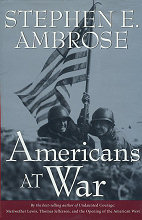
AMBROSE : Americans at war (fülszöveg)
Perhaps no other historian has concentrated on modern America at war so strikingly as Stephen E. Ambrose.
Although World War II has been the backdrop for most of this acclaimed historian's work, he writes here of America's other wars too—the Civil War, Korea, Vietnam, and the Cold War. From Vicksburg to My Lai Ambrose covers the fields of battle so authoritatively, portrays the figures and the personalities so convincingly, and recounts the history so compellingly that his reader feels present as momentous issues are considered and as decisions are made. Ranging over the many wars that have enveloped Americans and their leaders (Custer, Eisenhower, Patton, MacArthur, FDR, and Nixon), these exemplary commentaries show leadership as it is tested, confirmed, or refuted in the theater of war.
Ambrose's theme, the American way of war, is significant, for war indeed has delineated each era in America's turbulent history and has focused the nation's democratic perspective.
Throughout, these essays encompass two large subjects. First, Ambrose is drawn to the experiences of those who have gone to war, both the leaders and the led. Second, he is intrigued by men who make big decisions—or fail to make them. He concludes that generals alone don't win wars. Infantrymen, he believes, as well as the generals and the intelligence officers, were responsible for the Allied victory in World War II. And although the stalwart common soldier is credited with winning America's wars, Ambrose also gives fair and empathetic examination to soldiers who break under strain.
In its wars America defines itself. Because democracies employ teamwork, Ambrose believes they are by far the most efficient governments for fighting wars. With scrupulous historical perspective he shows that this country's times of conflict reveal a national character that is essentially American.
He writes of how the siege of Vicksburg proved to be the turning point in the Civil War. He assesses the heroism and controversy that beset General Custer. He appraises America's "dumb luck" entry into World War II and evaluates the dropping of the atomic bomb and its consequences. Eisenhower, on whom Ambrose has published a definitive biography, is seen here in his key role in the NATO pact and through his war-stressed friendship with General Patton. Ambrose assays the enormous power and leverage of General MacArthur, reports the effects of war on the home front, gives a personal, step-by-step analysis of D-Day logistics, and closely studies the role of military intelligence in the winning of the European war. Ambrose brings understanding to the Vietnam conflict through a close look at the atrocity at My Lai and at the contentious Christmas Bombing of Hanoi. He concludes his chronicle of America at war by focusing on the realities of the Cold War and on a chilling, well-reasoned hypothesis of what war, devoid of ideology, may be like in the twenty-first century.